
Level 2 Geography
2GEO Subject DescriptionTeacher in Charge: Mr J. Gunn.
Recommended Prior LearningL1 Geography or another Social Science subject, or by having a discussion with Mr Gunn in G4.
What to find out more, drop into G4 and have a chat with Mr Gunn.

By studying geography, students are able to recognise the responsibilities they have in relation to other people, the environment, and the long-term sustainability of the planet. Learn about how both people and nature shape the environments in which we live. Investigate and interpret geographic patterns, features and processes including how these change over time. Key areas of study include; sustainability of the Christchurch Biophysical Environment, Craigieburn Ranges field trip based research, the spread of malaria on a global scale, geographic skills and concepts, as well as landscapes of mountainous environments. A high interest course that helps interpret the world in which we live. Note: By completing both Level Two and Level Three Geography students can meet their U.E. Literacy requirements.
Students are to complete four of the five standards offered below. It is important to consider your U.E. Literacy requirements in your selection. Students gain gain their full U.E Literacy by doing L2 and L3 Geography.
Level 2 Geography offers 14 Credits, from 4 Achievement standards which offers 4 credits towards your U.E. Literacy.
Subject Overview
Term 1
Geographic Concepts - Sustainability, Change, Interaction, Patterns, Processes, Perspectives, Environment
Understanding the interaction of the natural and built up environment around Christchurch/Canterbury
Sustainability - Biophysical environment sustainability field trip
Geographic Skills and Concepts ongoing
Term 2
Geographic Research - Ecosystems in the South Island High Country. Craigieburn field trip
Global Patterns as a result of human activity - based on contributors to health patterns and climate, such as Malaria
Geographic Skills and Concepts ongoing
Term 3
Natural Landscapes, such as mountains, focus on the South Island High
Geographic Skills and Concepts ongoing
Term 4
Revision for Externals. Geographic Skills and Concepts
Tikanga ā-iwi - Social Sciences
Assessment Information
2.1 Natural Landscapes, may offered subject to student needs.
Quarantine Officer, Recycler/Dismantler, Water/Wastewater Treatment Operator, Geospatial Specialist, Urban/Regional Planner, Science Technician, Civil Engineer, Civil Engineering Technician/Draughtsperson, Miner/Quarry Worker, Mine/Quarry Manager, Conservator, Dairy Farmer, Mining Engineer, Agricultural/Horticultural Scientist, Forensic Scientist, Agricultural/Horticultural Consultant, Driller, Geologist, Environmental Scientist, Zoologist, Energy/Carbon Auditor, Statistician, Environmental Engineer, Environmental/Public Health Officer, Marine Biologist, Ranger, Fishery Officer, Forest Manager, Forestry Scientist, Pest Control Technician, Landscape Architect, Health Promoter, Biosecurity Officer, Dairy Herd Manager, Immigration Officer
Approximate Costs and Equipment/StationeryTwo Field Trips. Ōtautahi, Christchurch Sustainability field trip. South Island High Country ecosystems geographic research to Craigieburn. As these are curriculum based day trips, there is currently no charge.